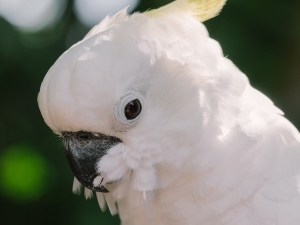
Birds have different body parts than humans do, they have wings, beaks, and crops to name a few.
Your bird may sometimes need to adjust its crop. This article looks into why your bird may need to adjust its crop.
Table of Contents
Why do birds adjust their crop?
Crop adjusting is normal from time to time, and birds who need to adjust their crops will do this for good reason.
Here is why your bird may need to adjust its crop:
The bird is full:
If your bird is young, and doesn’t know how much food is enough, or, if the bird is very excited about eating food, then it may eat too much in one go.
The bird may eat too much to the point where its crop becomes engorged with food.
This will be uncomfortable and the bird will need to adjust its crop.
What to do:
This is normal and isn’t something to worry about, the food will soon pass into the bird’s stomach and the bird will be fine afterwards.
Stuck foreign object:
If there is a foreign object stuck in the bird’s crop, and the crop can’t move this foreign object down on its own, then the bird may try to adjust its crop to help the foreign object get down to the stomach.
What to do:
You may not be able to see that the bird has something stuck in its crop but you may be able to feel it.
Try to feel for the object by palpitating the crop. If you’re able to feel it then you may have to take the bird to the vet.
You’d need to take the bird to the vet as the bird may need surgery to remove the object.
If the object is not removed, and the object is blocking food from getting down into the bird’s stomach, then food will stay stuck in the bird’s crop, won’t move to the stomach, and the bird may starve.
Parasites:
Some parasitic infections can make the bird appear to be adjusting its crop, canker is one and gapeworm is another.
Canker affects the bird’s digestive tract, the crop included.
Gapeworm affects the bird’s trachea, the gapeworms will live in the bird’s trachea.
Both of these conditions will cause birds to look like they are adjusting their crop ie: stretching their necks after eating or at odd times during the day
What to do:
Keep an eye out for other symptoms to determine if the bird has gapeworm or canker.
A big sign that indicates that your bird has canker is yellowish cheesy lesions in the bird’s throat
Treatments for canker come in pill form and powder form and these can be found at your vet, online, and at pet stores.
Your bird may alternatively be suffering a gapeworm infection.
Other signs of gapeworm in birds include gasping, loss of appetite, yawning, coughing, sneezing, head shaking, and loss of appetite.
Treatment for this condition is two rounds of dewormers.
The first round of treatment will kill off the worms that are currently affecting your bird.
The next round will kill off the worms that hatch from the eggs produced by the first worms.
If you enjoyed this article then you may also be interested in other bird related articles. Here are some articles that you may be interested in: Why Does My Bird Open His Mouth When I Pet Him?, Chick Hatched With Open Navel, Why Is My Canary Whimpering?, Pipped Egg Rolled Over, What Do Birds Sharpen Their Beaks With?, Canary Sleeping With Its Head Down, Bird Opening Mouth And Stretching Neck, Why Does My Lovebird Rub His Beak On The Cage, Can Baby Birds Drown In The Nest

